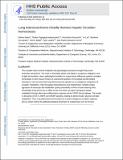Lung Adenocarcinoma Distally Rewires Hepatic Circadian Homeostasis
Author(s)
Masri, Selma; Kinouchi, Kenichiro; Liu, Yu; Cervantes, Marlene; Baldi, Pierre; Sassone-Corsi, Paolo; Papagiannakopoulos, Thales; Jacks, Tyler E.; ... Show more Show less
Downloadnihms780858.pdf (1.869Mb)
PUBLISHER_CC
Publisher with Creative Commons License
Creative Commons Attribution
Terms of use
Metadata
Show full item recordAbstract
The circadian clock controls metabolic and physiological processes through finely tuned molecular mechanisms. The clock is remarkably plastic and adapts to exogenous "zeitgebers," such as light and nutrition. How a pathological condition in a given tissue influences systemic circadian homeostasis in other tissues remains an unanswered question of conceptual and biomedical importance. Here, we show that lung adenocarcinoma operates as an endogenous reorganizer of circadian metabolism. High-throughput transcriptomics and metabolomics revealed unique signatures of transcripts and metabolites cycling exclusively in livers of tumor-bearing mice. Remarkably, lung cancer has no effect on the core clock but rather reprograms hepatic metabolism through altered pro-inflammatory response via the STAT3-Socs3 pathway. This results in disruption of AKT, AMPK, and SREBP signaling, leading to altered insulin, glucose, and lipid metabolism. Thus, lung adenocarcinoma functions as a potent endogenous circadian organizer (ECO), which rewires the pathophysiological dimension of a distal tissue such as the liver.
Date issued
2018-06-25Department
Massachusetts Institute of Technology. Division of Comparative Medicine; Howard Hughes Medical InstituteJournal
Cell
Publisher
Elsevier
Citation
Masri, Selma et al. “Lung Adenocarcinoma Distally Rewires Hepatic Circadian Homeostasis.” Cell 165, 4 (May 2016): 896–909 © 2016 Elsevier Inc
Version: Author's final manuscript
ISSN
0092-8674
1097-4172